Business Law: Contractual Obligations and Liability
VerifiedAdded on 2023/06/05
|9
|2427
|302
AI Summary
This study material discusses the legal principles related to contractual obligations and liability in business law. It provides answers to two case studies related to contract law, covering topics such as ratification, legal capacity, intention to bind parties, pre-contractual duty, and unfair contract terms. The material also cites relevant cases and laws to support the arguments presented.
Contribute Materials
Your contribution can guide someone’s learning journey. Share your
documents today.
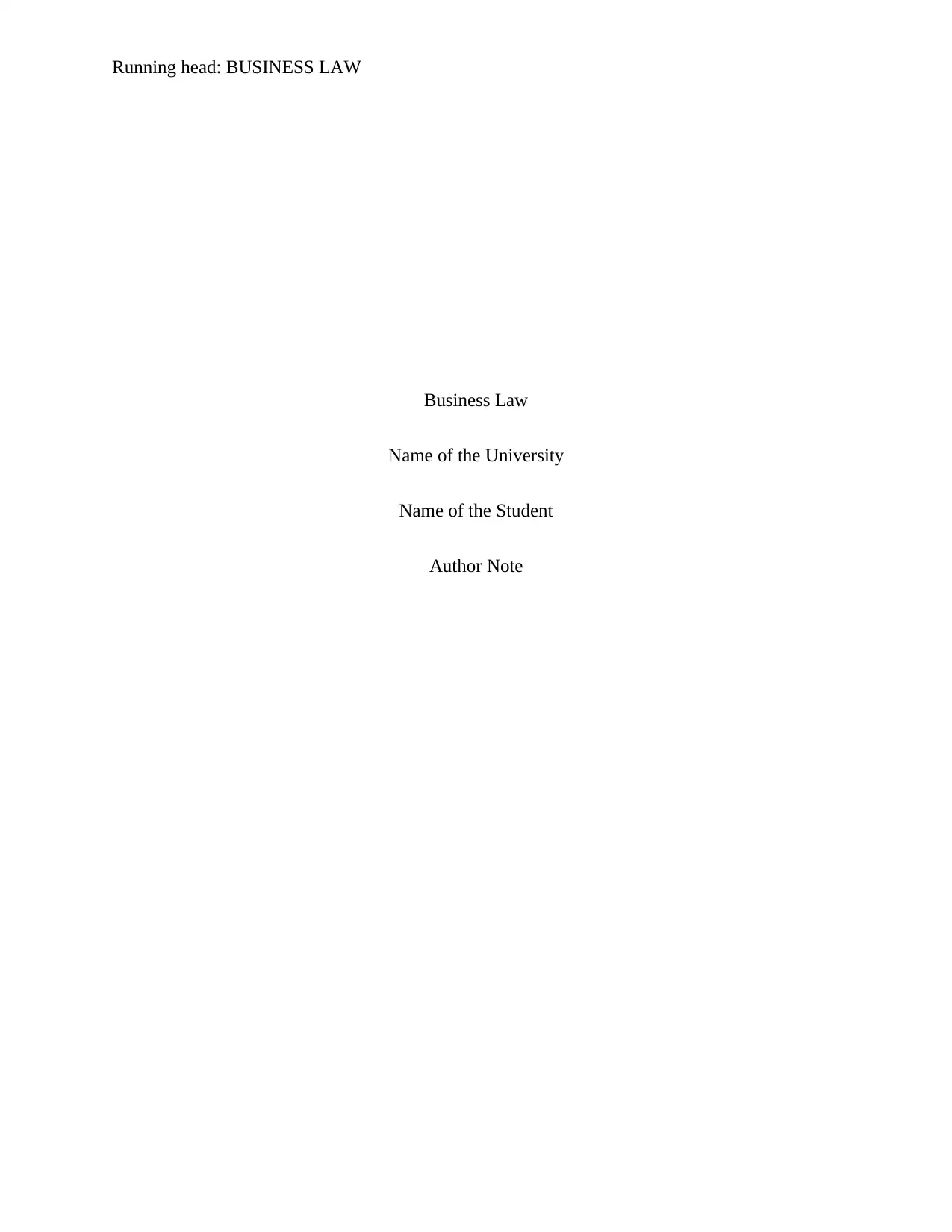
Running head: BUSINESS LAW
Business Law
Name of the University
Name of the Student
Author Note
Business Law
Name of the University
Name of the Student
Author Note
Secure Best Marks with AI Grader
Need help grading? Try our AI Grader for instant feedback on your assignments.
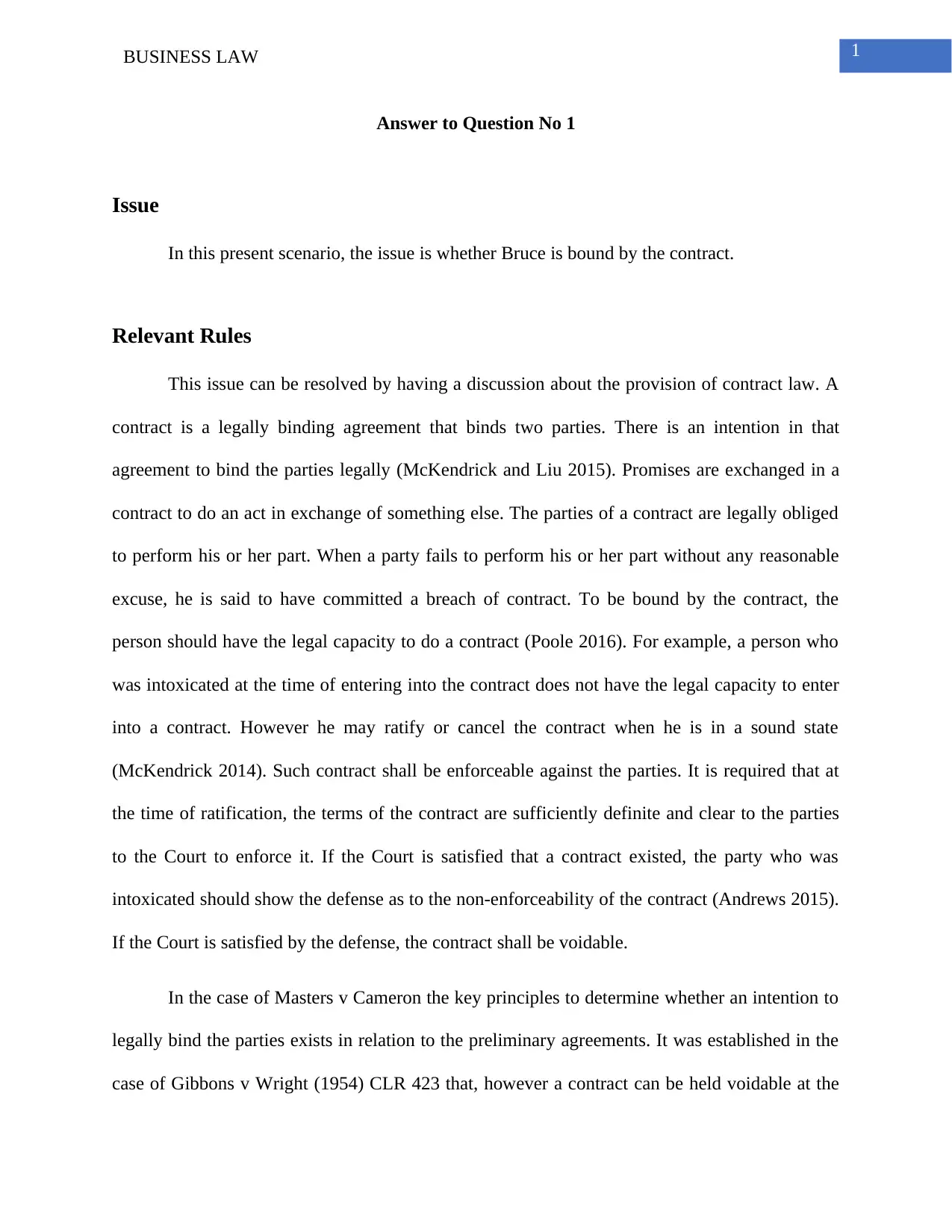
1BUSINESS LAW
Answer to Question No 1
Issue
In this present scenario, the issue is whether Bruce is bound by the contract.
Relevant Rules
This issue can be resolved by having a discussion about the provision of contract law. A
contract is a legally binding agreement that binds two parties. There is an intention in that
agreement to bind the parties legally (McKendrick and Liu 2015). Promises are exchanged in a
contract to do an act in exchange of something else. The parties of a contract are legally obliged
to perform his or her part. When a party fails to perform his or her part without any reasonable
excuse, he is said to have committed a breach of contract. To be bound by the contract, the
person should have the legal capacity to do a contract (Poole 2016). For example, a person who
was intoxicated at the time of entering into the contract does not have the legal capacity to enter
into a contract. However he may ratify or cancel the contract when he is in a sound state
(McKendrick 2014). Such contract shall be enforceable against the parties. It is required that at
the time of ratification, the terms of the contract are sufficiently definite and clear to the parties
to the Court to enforce it. If the Court is satisfied that a contract existed, the party who was
intoxicated should show the defense as to the non-enforceability of the contract (Andrews 2015).
If the Court is satisfied by the defense, the contract shall be voidable.
In the case of Masters v Cameron the key principles to determine whether an intention to
legally bind the parties exists in relation to the preliminary agreements. It was established in the
case of Gibbons v Wright (1954) CLR 423 that, however a contract can be held voidable at the
Answer to Question No 1
Issue
In this present scenario, the issue is whether Bruce is bound by the contract.
Relevant Rules
This issue can be resolved by having a discussion about the provision of contract law. A
contract is a legally binding agreement that binds two parties. There is an intention in that
agreement to bind the parties legally (McKendrick and Liu 2015). Promises are exchanged in a
contract to do an act in exchange of something else. The parties of a contract are legally obliged
to perform his or her part. When a party fails to perform his or her part without any reasonable
excuse, he is said to have committed a breach of contract. To be bound by the contract, the
person should have the legal capacity to do a contract (Poole 2016). For example, a person who
was intoxicated at the time of entering into the contract does not have the legal capacity to enter
into a contract. However he may ratify or cancel the contract when he is in a sound state
(McKendrick 2014). Such contract shall be enforceable against the parties. It is required that at
the time of ratification, the terms of the contract are sufficiently definite and clear to the parties
to the Court to enforce it. If the Court is satisfied that a contract existed, the party who was
intoxicated should show the defense as to the non-enforceability of the contract (Andrews 2015).
If the Court is satisfied by the defense, the contract shall be voidable.
In the case of Masters v Cameron the key principles to determine whether an intention to
legally bind the parties exists in relation to the preliminary agreements. It was established in the
case of Gibbons v Wright (1954) CLR 423 that, however a contract can be held voidable at the
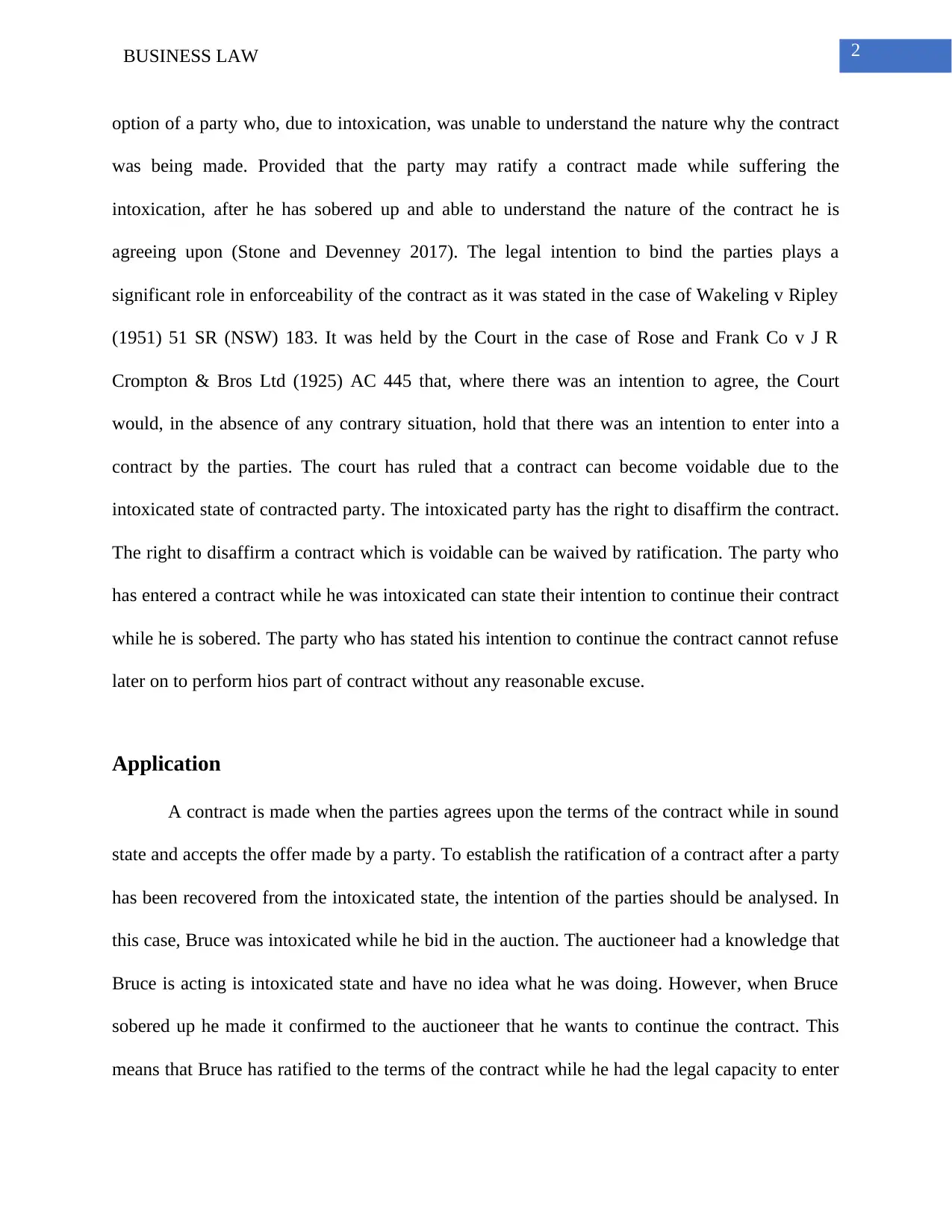
2BUSINESS LAW
option of a party who, due to intoxication, was unable to understand the nature why the contract
was being made. Provided that the party may ratify a contract made while suffering the
intoxication, after he has sobered up and able to understand the nature of the contract he is
agreeing upon (Stone and Devenney 2017). The legal intention to bind the parties plays a
significant role in enforceability of the contract as it was stated in the case of Wakeling v Ripley
(1951) 51 SR (NSW) 183. It was held by the Court in the case of Rose and Frank Co v J R
Crompton & Bros Ltd (1925) AC 445 that, where there was an intention to agree, the Court
would, in the absence of any contrary situation, hold that there was an intention to enter into a
contract by the parties. The court has ruled that a contract can become voidable due to the
intoxicated state of contracted party. The intoxicated party has the right to disaffirm the contract.
The right to disaffirm a contract which is voidable can be waived by ratification. The party who
has entered a contract while he was intoxicated can state their intention to continue their contract
while he is sobered. The party who has stated his intention to continue the contract cannot refuse
later on to perform hios part of contract without any reasonable excuse.
Application
A contract is made when the parties agrees upon the terms of the contract while in sound
state and accepts the offer made by a party. To establish the ratification of a contract after a party
has been recovered from the intoxicated state, the intention of the parties should be analysed. In
this case, Bruce was intoxicated while he bid in the auction. The auctioneer had a knowledge that
Bruce is acting is intoxicated state and have no idea what he was doing. However, when Bruce
sobered up he made it confirmed to the auctioneer that he wants to continue the contract. This
means that Bruce has ratified to the terms of the contract while he had the legal capacity to enter
option of a party who, due to intoxication, was unable to understand the nature why the contract
was being made. Provided that the party may ratify a contract made while suffering the
intoxication, after he has sobered up and able to understand the nature of the contract he is
agreeing upon (Stone and Devenney 2017). The legal intention to bind the parties plays a
significant role in enforceability of the contract as it was stated in the case of Wakeling v Ripley
(1951) 51 SR (NSW) 183. It was held by the Court in the case of Rose and Frank Co v J R
Crompton & Bros Ltd (1925) AC 445 that, where there was an intention to agree, the Court
would, in the absence of any contrary situation, hold that there was an intention to enter into a
contract by the parties. The court has ruled that a contract can become voidable due to the
intoxicated state of contracted party. The intoxicated party has the right to disaffirm the contract.
The right to disaffirm a contract which is voidable can be waived by ratification. The party who
has entered a contract while he was intoxicated can state their intention to continue their contract
while he is sobered. The party who has stated his intention to continue the contract cannot refuse
later on to perform hios part of contract without any reasonable excuse.
Application
A contract is made when the parties agrees upon the terms of the contract while in sound
state and accepts the offer made by a party. To establish the ratification of a contract after a party
has been recovered from the intoxicated state, the intention of the parties should be analysed. In
this case, Bruce was intoxicated while he bid in the auction. The auctioneer had a knowledge that
Bruce is acting is intoxicated state and have no idea what he was doing. However, when Bruce
sobered up he made it confirmed to the auctioneer that he wants to continue the contract. This
means that Bruce has ratified to the terms of the contract while he had the legal capacity to enter
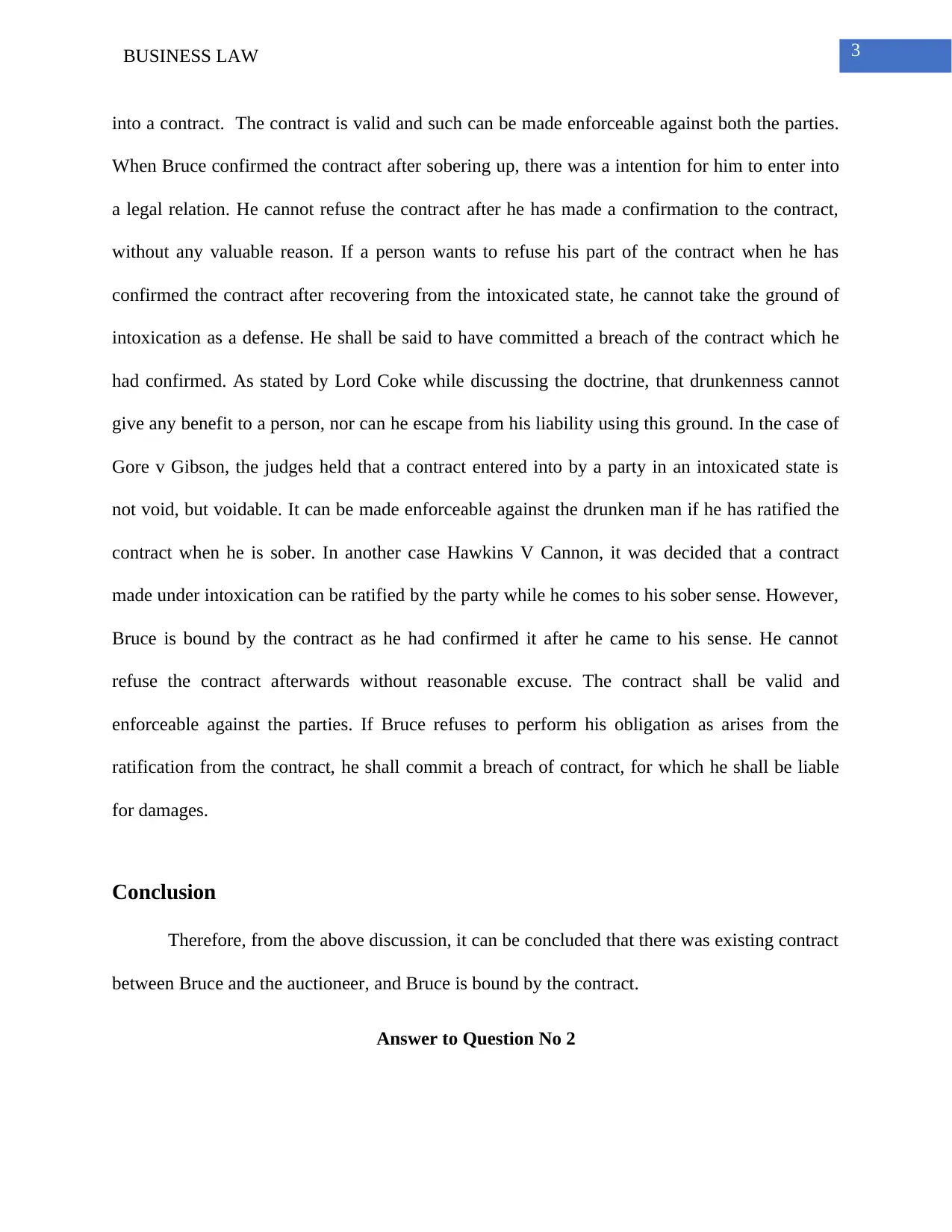
3BUSINESS LAW
into a contract. The contract is valid and such can be made enforceable against both the parties.
When Bruce confirmed the contract after sobering up, there was a intention for him to enter into
a legal relation. He cannot refuse the contract after he has made a confirmation to the contract,
without any valuable reason. If a person wants to refuse his part of the contract when he has
confirmed the contract after recovering from the intoxicated state, he cannot take the ground of
intoxication as a defense. He shall be said to have committed a breach of the contract which he
had confirmed. As stated by Lord Coke while discussing the doctrine, that drunkenness cannot
give any benefit to a person, nor can he escape from his liability using this ground. In the case of
Gore v Gibson, the judges held that a contract entered into by a party in an intoxicated state is
not void, but voidable. It can be made enforceable against the drunken man if he has ratified the
contract when he is sober. In another case Hawkins V Cannon, it was decided that a contract
made under intoxication can be ratified by the party while he comes to his sober sense. However,
Bruce is bound by the contract as he had confirmed it after he came to his sense. He cannot
refuse the contract afterwards without reasonable excuse. The contract shall be valid and
enforceable against the parties. If Bruce refuses to perform his obligation as arises from the
ratification from the contract, he shall commit a breach of contract, for which he shall be liable
for damages.
Conclusion
Therefore, from the above discussion, it can be concluded that there was existing contract
between Bruce and the auctioneer, and Bruce is bound by the contract.
Answer to Question No 2
into a contract. The contract is valid and such can be made enforceable against both the parties.
When Bruce confirmed the contract after sobering up, there was a intention for him to enter into
a legal relation. He cannot refuse the contract after he has made a confirmation to the contract,
without any valuable reason. If a person wants to refuse his part of the contract when he has
confirmed the contract after recovering from the intoxicated state, he cannot take the ground of
intoxication as a defense. He shall be said to have committed a breach of the contract which he
had confirmed. As stated by Lord Coke while discussing the doctrine, that drunkenness cannot
give any benefit to a person, nor can he escape from his liability using this ground. In the case of
Gore v Gibson, the judges held that a contract entered into by a party in an intoxicated state is
not void, but voidable. It can be made enforceable against the drunken man if he has ratified the
contract when he is sober. In another case Hawkins V Cannon, it was decided that a contract
made under intoxication can be ratified by the party while he comes to his sober sense. However,
Bruce is bound by the contract as he had confirmed it after he came to his sense. He cannot
refuse the contract afterwards without reasonable excuse. The contract shall be valid and
enforceable against the parties. If Bruce refuses to perform his obligation as arises from the
ratification from the contract, he shall commit a breach of contract, for which he shall be liable
for damages.
Conclusion
Therefore, from the above discussion, it can be concluded that there was existing contract
between Bruce and the auctioneer, and Bruce is bound by the contract.
Answer to Question No 2
Secure Best Marks with AI Grader
Need help grading? Try our AI Grader for instant feedback on your assignments.
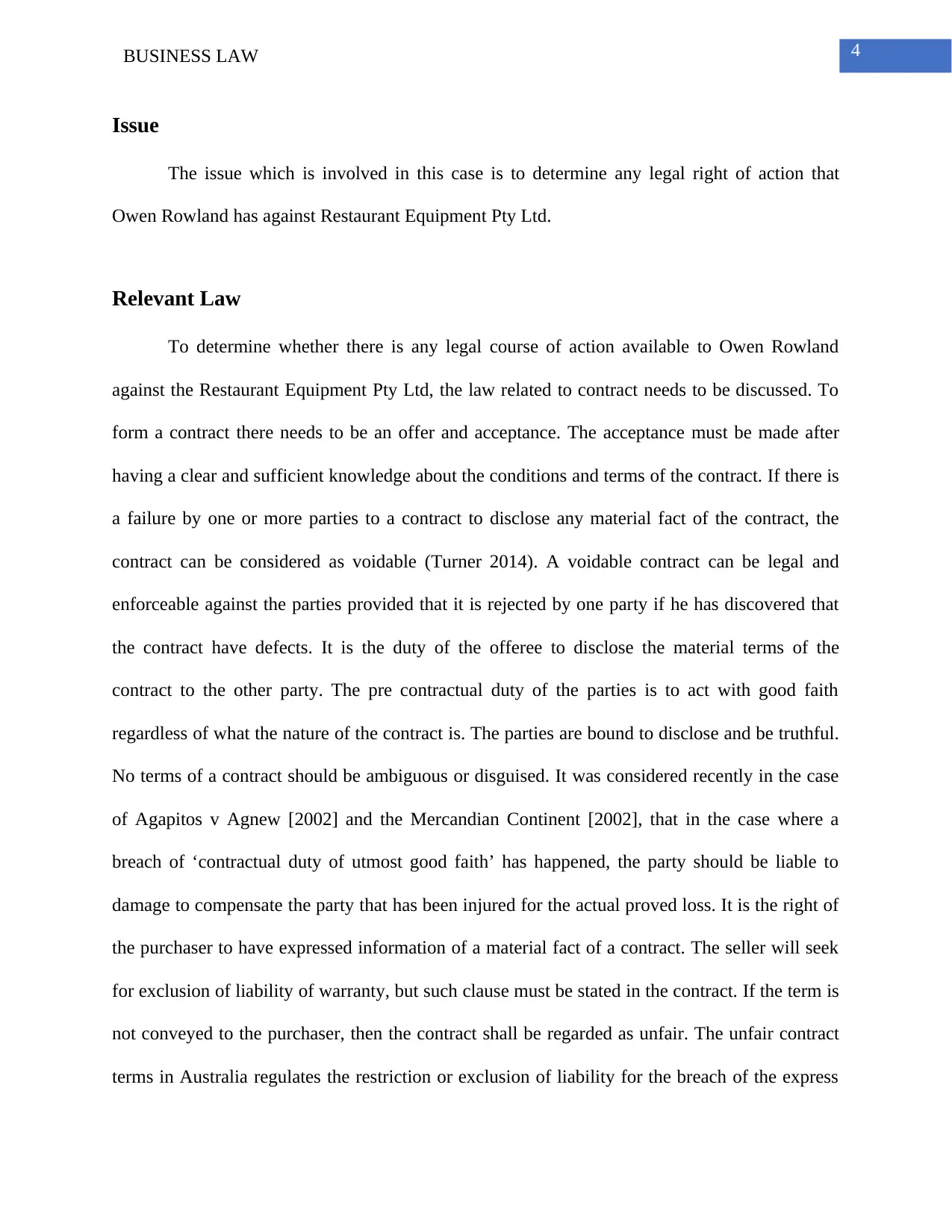
4BUSINESS LAW
Issue
The issue which is involved in this case is to determine any legal right of action that
Owen Rowland has against Restaurant Equipment Pty Ltd.
Relevant Law
To determine whether there is any legal course of action available to Owen Rowland
against the Restaurant Equipment Pty Ltd, the law related to contract needs to be discussed. To
form a contract there needs to be an offer and acceptance. The acceptance must be made after
having a clear and sufficient knowledge about the conditions and terms of the contract. If there is
a failure by one or more parties to a contract to disclose any material fact of the contract, the
contract can be considered as voidable (Turner 2014). A voidable contract can be legal and
enforceable against the parties provided that it is rejected by one party if he has discovered that
the contract have defects. It is the duty of the offeree to disclose the material terms of the
contract to the other party. The pre contractual duty of the parties is to act with good faith
regardless of what the nature of the contract is. The parties are bound to disclose and be truthful.
No terms of a contract should be ambiguous or disguised. It was considered recently in the case
of Agapitos v Agnew [2002] and the Mercandian Continent [2002], that in the case where a
breach of ‘contractual duty of utmost good faith’ has happened, the party should be liable to
damage to compensate the party that has been injured for the actual proved loss. It is the right of
the purchaser to have expressed information of a material fact of a contract. The seller will seek
for exclusion of liability of warranty, but such clause must be stated in the contract. If the term is
not conveyed to the purchaser, then the contract shall be regarded as unfair. The unfair contract
terms in Australia regulates the restriction or exclusion of liability for the breach of the express
Issue
The issue which is involved in this case is to determine any legal right of action that
Owen Rowland has against Restaurant Equipment Pty Ltd.
Relevant Law
To determine whether there is any legal course of action available to Owen Rowland
against the Restaurant Equipment Pty Ltd, the law related to contract needs to be discussed. To
form a contract there needs to be an offer and acceptance. The acceptance must be made after
having a clear and sufficient knowledge about the conditions and terms of the contract. If there is
a failure by one or more parties to a contract to disclose any material fact of the contract, the
contract can be considered as voidable (Turner 2014). A voidable contract can be legal and
enforceable against the parties provided that it is rejected by one party if he has discovered that
the contract have defects. It is the duty of the offeree to disclose the material terms of the
contract to the other party. The pre contractual duty of the parties is to act with good faith
regardless of what the nature of the contract is. The parties are bound to disclose and be truthful.
No terms of a contract should be ambiguous or disguised. It was considered recently in the case
of Agapitos v Agnew [2002] and the Mercandian Continent [2002], that in the case where a
breach of ‘contractual duty of utmost good faith’ has happened, the party should be liable to
damage to compensate the party that has been injured for the actual proved loss. It is the right of
the purchaser to have expressed information of a material fact of a contract. The seller will seek
for exclusion of liability of warranty, but such clause must be stated in the contract. If the term is
not conveyed to the purchaser, then the contract shall be regarded as unfair. The unfair contract
terms in Australia regulates the restriction or exclusion of liability for the breach of the express
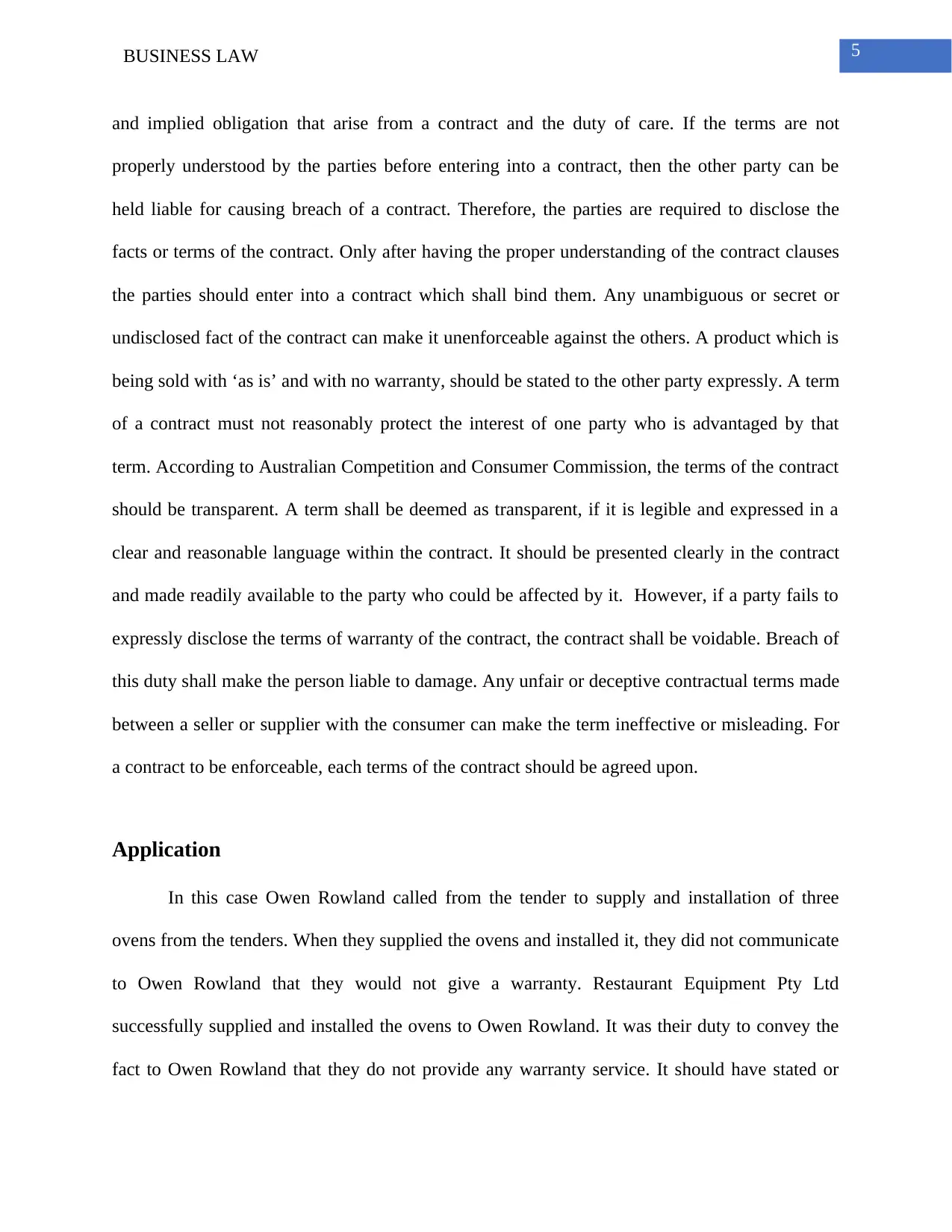
5BUSINESS LAW
and implied obligation that arise from a contract and the duty of care. If the terms are not
properly understood by the parties before entering into a contract, then the other party can be
held liable for causing breach of a contract. Therefore, the parties are required to disclose the
facts or terms of the contract. Only after having the proper understanding of the contract clauses
the parties should enter into a contract which shall bind them. Any unambiguous or secret or
undisclosed fact of the contract can make it unenforceable against the others. A product which is
being sold with ‘as is’ and with no warranty, should be stated to the other party expressly. A term
of a contract must not reasonably protect the interest of one party who is advantaged by that
term. According to Australian Competition and Consumer Commission, the terms of the contract
should be transparent. A term shall be deemed as transparent, if it is legible and expressed in a
clear and reasonable language within the contract. It should be presented clearly in the contract
and made readily available to the party who could be affected by it. However, if a party fails to
expressly disclose the terms of warranty of the contract, the contract shall be voidable. Breach of
this duty shall make the person liable to damage. Any unfair or deceptive contractual terms made
between a seller or supplier with the consumer can make the term ineffective or misleading. For
a contract to be enforceable, each terms of the contract should be agreed upon.
Application
In this case Owen Rowland called from the tender to supply and installation of three
ovens from the tenders. When they supplied the ovens and installed it, they did not communicate
to Owen Rowland that they would not give a warranty. Restaurant Equipment Pty Ltd
successfully supplied and installed the ovens to Owen Rowland. It was their duty to convey the
fact to Owen Rowland that they do not provide any warranty service. It should have stated or
and implied obligation that arise from a contract and the duty of care. If the terms are not
properly understood by the parties before entering into a contract, then the other party can be
held liable for causing breach of a contract. Therefore, the parties are required to disclose the
facts or terms of the contract. Only after having the proper understanding of the contract clauses
the parties should enter into a contract which shall bind them. Any unambiguous or secret or
undisclosed fact of the contract can make it unenforceable against the others. A product which is
being sold with ‘as is’ and with no warranty, should be stated to the other party expressly. A term
of a contract must not reasonably protect the interest of one party who is advantaged by that
term. According to Australian Competition and Consumer Commission, the terms of the contract
should be transparent. A term shall be deemed as transparent, if it is legible and expressed in a
clear and reasonable language within the contract. It should be presented clearly in the contract
and made readily available to the party who could be affected by it. However, if a party fails to
expressly disclose the terms of warranty of the contract, the contract shall be voidable. Breach of
this duty shall make the person liable to damage. Any unfair or deceptive contractual terms made
between a seller or supplier with the consumer can make the term ineffective or misleading. For
a contract to be enforceable, each terms of the contract should be agreed upon.
Application
In this case Owen Rowland called from the tender to supply and installation of three
ovens from the tenders. When they supplied the ovens and installed it, they did not communicate
to Owen Rowland that they would not give a warranty. Restaurant Equipment Pty Ltd
successfully supplied and installed the ovens to Owen Rowland. It was their duty to convey the
fact to Owen Rowland that they do not provide any warranty service. It should have stated or
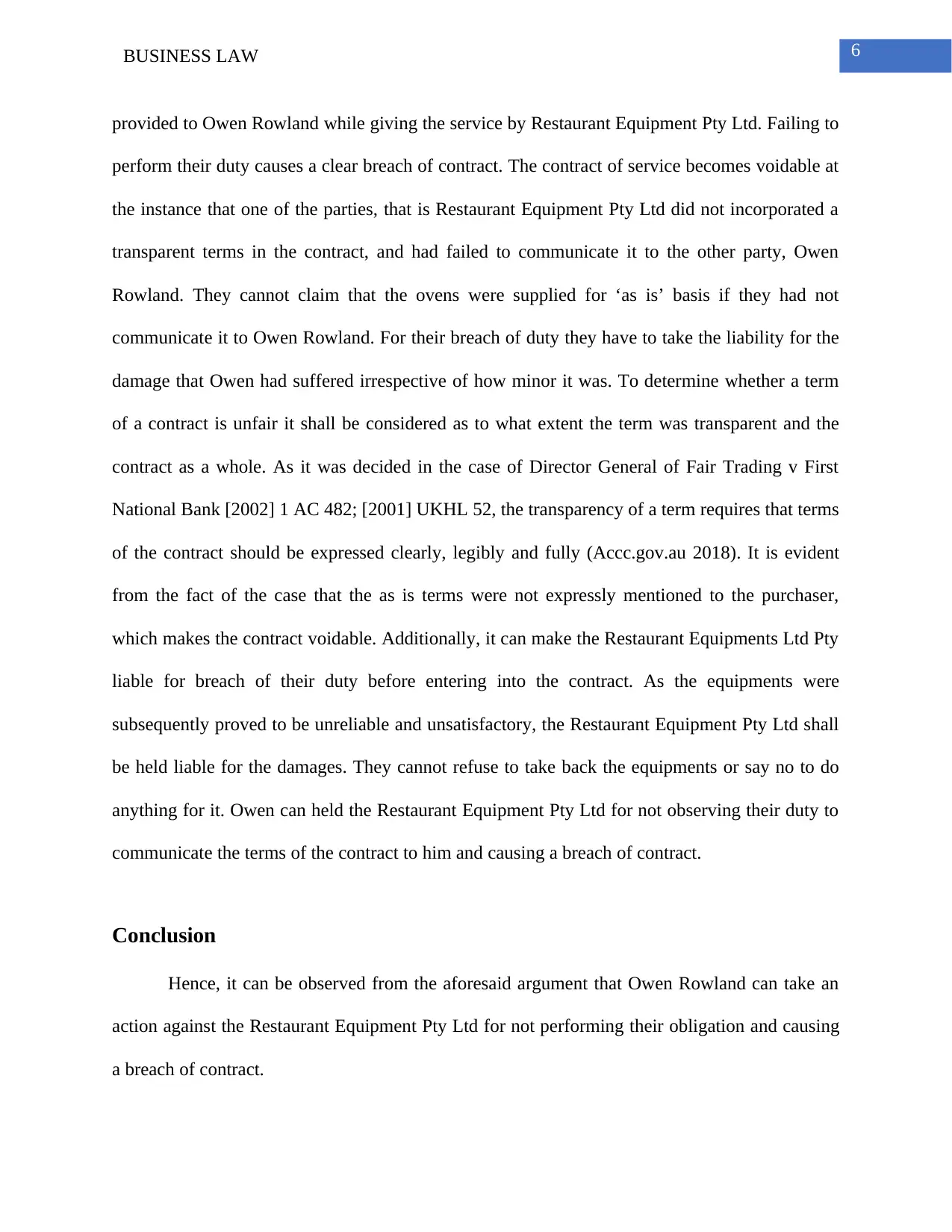
6BUSINESS LAW
provided to Owen Rowland while giving the service by Restaurant Equipment Pty Ltd. Failing to
perform their duty causes a clear breach of contract. The contract of service becomes voidable at
the instance that one of the parties, that is Restaurant Equipment Pty Ltd did not incorporated a
transparent terms in the contract, and had failed to communicate it to the other party, Owen
Rowland. They cannot claim that the ovens were supplied for ‘as is’ basis if they had not
communicate it to Owen Rowland. For their breach of duty they have to take the liability for the
damage that Owen had suffered irrespective of how minor it was. To determine whether a term
of a contract is unfair it shall be considered as to what extent the term was transparent and the
contract as a whole. As it was decided in the case of Director General of Fair Trading v First
National Bank [2002] 1 AC 482; [2001] UKHL 52, the transparency of a term requires that terms
of the contract should be expressed clearly, legibly and fully (Accc.gov.au 2018). It is evident
from the fact of the case that the as is terms were not expressly mentioned to the purchaser,
which makes the contract voidable. Additionally, it can make the Restaurant Equipments Ltd Pty
liable for breach of their duty before entering into the contract. As the equipments were
subsequently proved to be unreliable and unsatisfactory, the Restaurant Equipment Pty Ltd shall
be held liable for the damages. They cannot refuse to take back the equipments or say no to do
anything for it. Owen can held the Restaurant Equipment Pty Ltd for not observing their duty to
communicate the terms of the contract to him and causing a breach of contract.
Conclusion
Hence, it can be observed from the aforesaid argument that Owen Rowland can take an
action against the Restaurant Equipment Pty Ltd for not performing their obligation and causing
a breach of contract.
provided to Owen Rowland while giving the service by Restaurant Equipment Pty Ltd. Failing to
perform their duty causes a clear breach of contract. The contract of service becomes voidable at
the instance that one of the parties, that is Restaurant Equipment Pty Ltd did not incorporated a
transparent terms in the contract, and had failed to communicate it to the other party, Owen
Rowland. They cannot claim that the ovens were supplied for ‘as is’ basis if they had not
communicate it to Owen Rowland. For their breach of duty they have to take the liability for the
damage that Owen had suffered irrespective of how minor it was. To determine whether a term
of a contract is unfair it shall be considered as to what extent the term was transparent and the
contract as a whole. As it was decided in the case of Director General of Fair Trading v First
National Bank [2002] 1 AC 482; [2001] UKHL 52, the transparency of a term requires that terms
of the contract should be expressed clearly, legibly and fully (Accc.gov.au 2018). It is evident
from the fact of the case that the as is terms were not expressly mentioned to the purchaser,
which makes the contract voidable. Additionally, it can make the Restaurant Equipments Ltd Pty
liable for breach of their duty before entering into the contract. As the equipments were
subsequently proved to be unreliable and unsatisfactory, the Restaurant Equipment Pty Ltd shall
be held liable for the damages. They cannot refuse to take back the equipments or say no to do
anything for it. Owen can held the Restaurant Equipment Pty Ltd for not observing their duty to
communicate the terms of the contract to him and causing a breach of contract.
Conclusion
Hence, it can be observed from the aforesaid argument that Owen Rowland can take an
action against the Restaurant Equipment Pty Ltd for not performing their obligation and causing
a breach of contract.
Paraphrase This Document
Need a fresh take? Get an instant paraphrase of this document with our AI Paraphraser
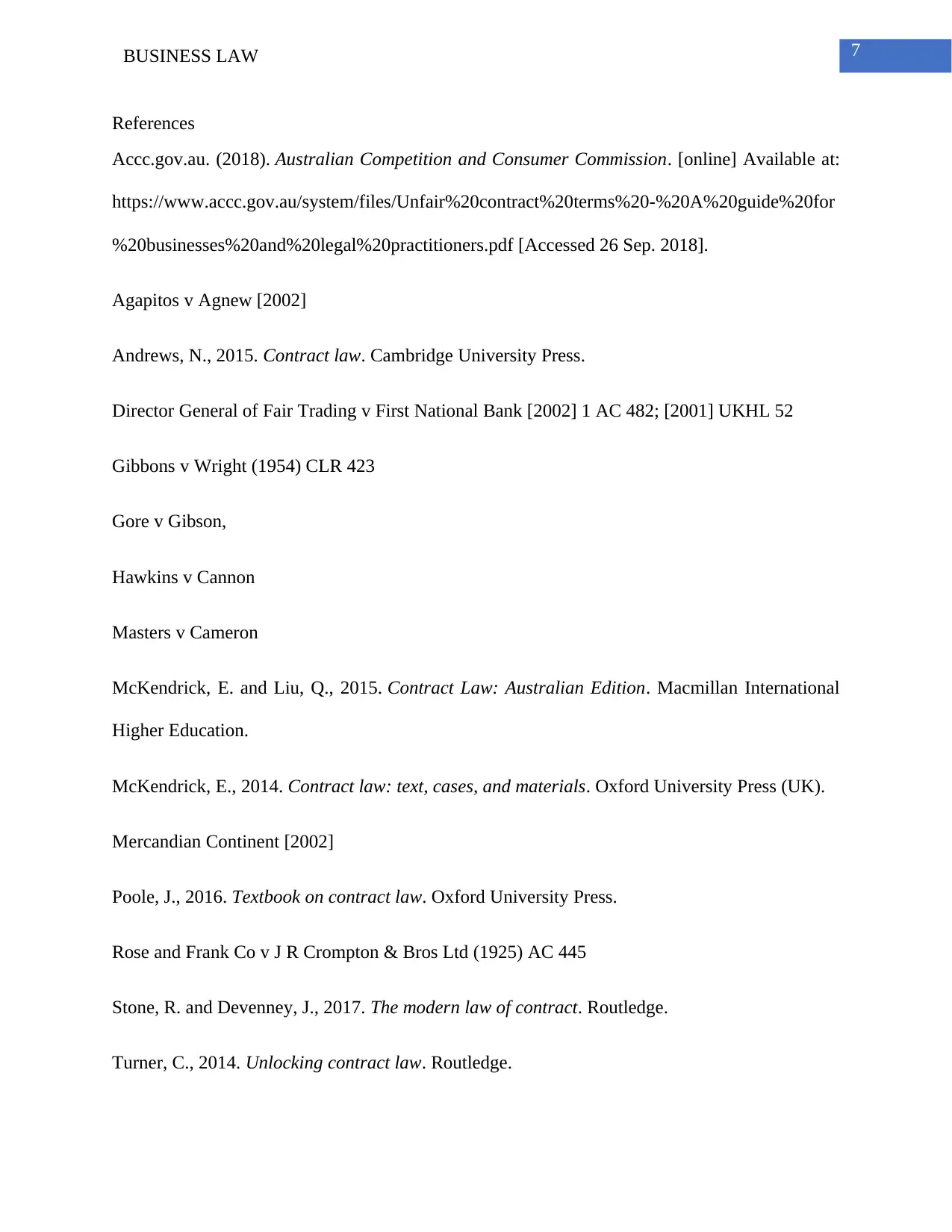
7BUSINESS LAW
References
Accc.gov.au. (2018). Australian Competition and Consumer Commission. [online] Available at:
https://www.accc.gov.au/system/files/Unfair%20contract%20terms%20-%20A%20guide%20for
%20businesses%20and%20legal%20practitioners.pdf [Accessed 26 Sep. 2018].
Agapitos v Agnew [2002]
Andrews, N., 2015. Contract law. Cambridge University Press.
Director General of Fair Trading v First National Bank [2002] 1 AC 482; [2001] UKHL 52
Gibbons v Wright (1954) CLR 423
Gore v Gibson,
Hawkins v Cannon
Masters v Cameron
McKendrick, E. and Liu, Q., 2015. Contract Law: Australian Edition. Macmillan International
Higher Education.
McKendrick, E., 2014. Contract law: text, cases, and materials. Oxford University Press (UK).
Mercandian Continent [2002]
Poole, J., 2016. Textbook on contract law. Oxford University Press.
Rose and Frank Co v J R Crompton & Bros Ltd (1925) AC 445
Stone, R. and Devenney, J., 2017. The modern law of contract. Routledge.
Turner, C., 2014. Unlocking contract law. Routledge.
References
Accc.gov.au. (2018). Australian Competition and Consumer Commission. [online] Available at:
https://www.accc.gov.au/system/files/Unfair%20contract%20terms%20-%20A%20guide%20for
%20businesses%20and%20legal%20practitioners.pdf [Accessed 26 Sep. 2018].
Agapitos v Agnew [2002]
Andrews, N., 2015. Contract law. Cambridge University Press.
Director General of Fair Trading v First National Bank [2002] 1 AC 482; [2001] UKHL 52
Gibbons v Wright (1954) CLR 423
Gore v Gibson,
Hawkins v Cannon
Masters v Cameron
McKendrick, E. and Liu, Q., 2015. Contract Law: Australian Edition. Macmillan International
Higher Education.
McKendrick, E., 2014. Contract law: text, cases, and materials. Oxford University Press (UK).
Mercandian Continent [2002]
Poole, J., 2016. Textbook on contract law. Oxford University Press.
Rose and Frank Co v J R Crompton & Bros Ltd (1925) AC 445
Stone, R. and Devenney, J., 2017. The modern law of contract. Routledge.
Turner, C., 2014. Unlocking contract law. Routledge.

8BUSINESS LAW
Wakeling v Ripley (1951) 51 SR (NSW) 183
Wakeling v Ripley (1951) 51 SR (NSW) 183
1 out of 9
Related Documents
Your All-in-One AI-Powered Toolkit for Academic Success.
+13062052269
info@desklib.com
Available 24*7 on WhatsApp / Email
![[object Object]](/_next/static/media/star-bottom.7253800d.svg)
Unlock your academic potential
© 2024 | Zucol Services PVT LTD | All rights reserved.




